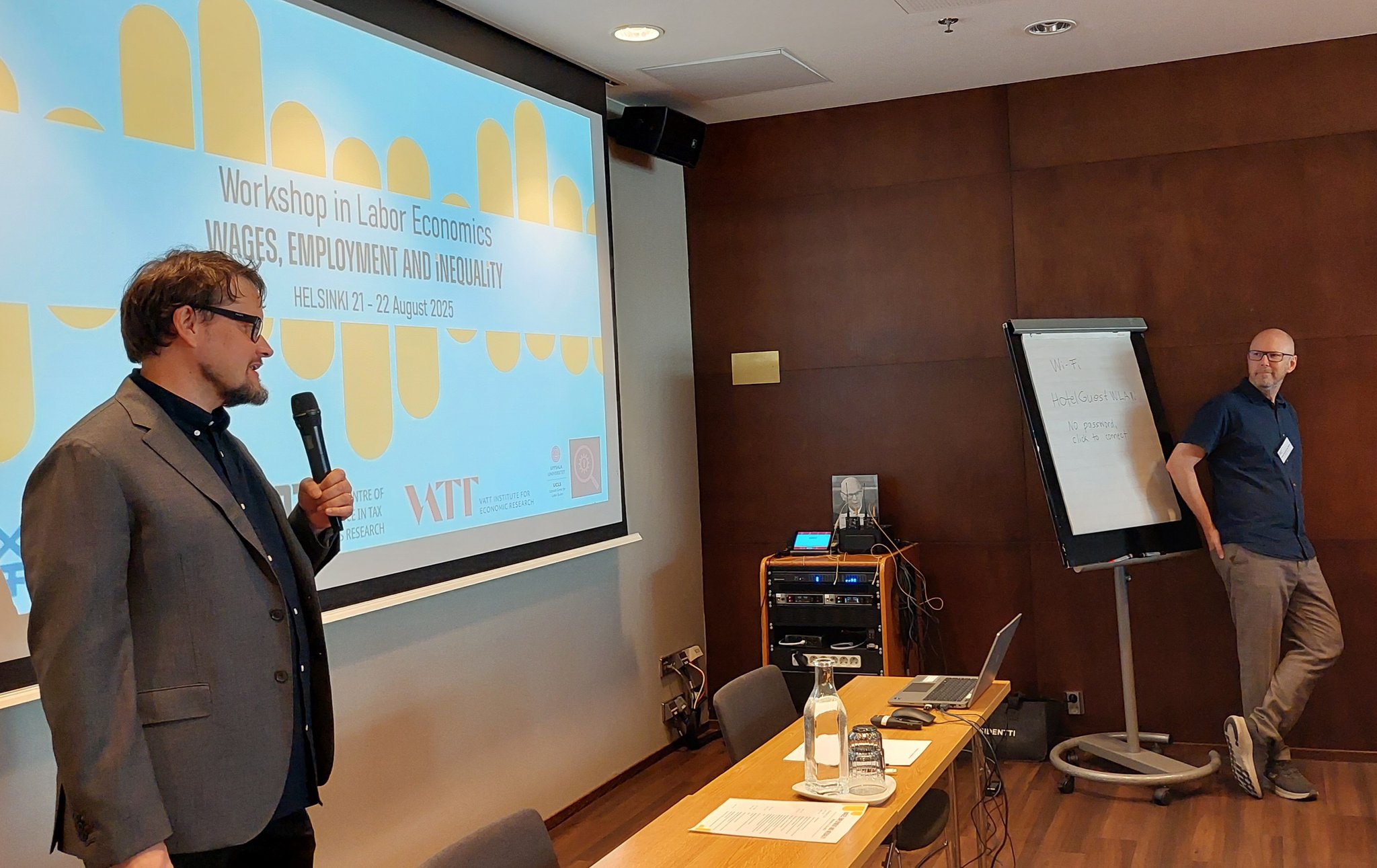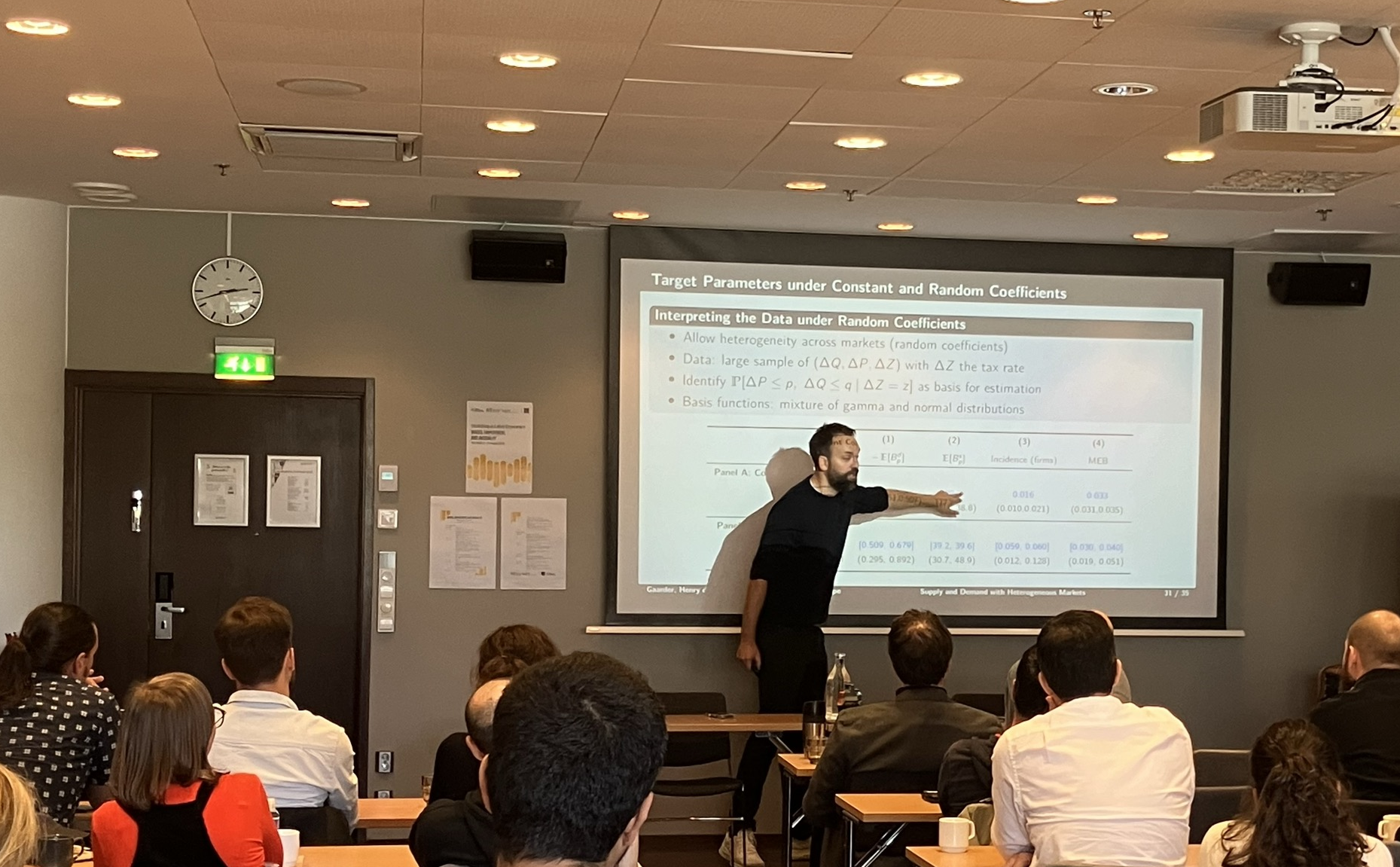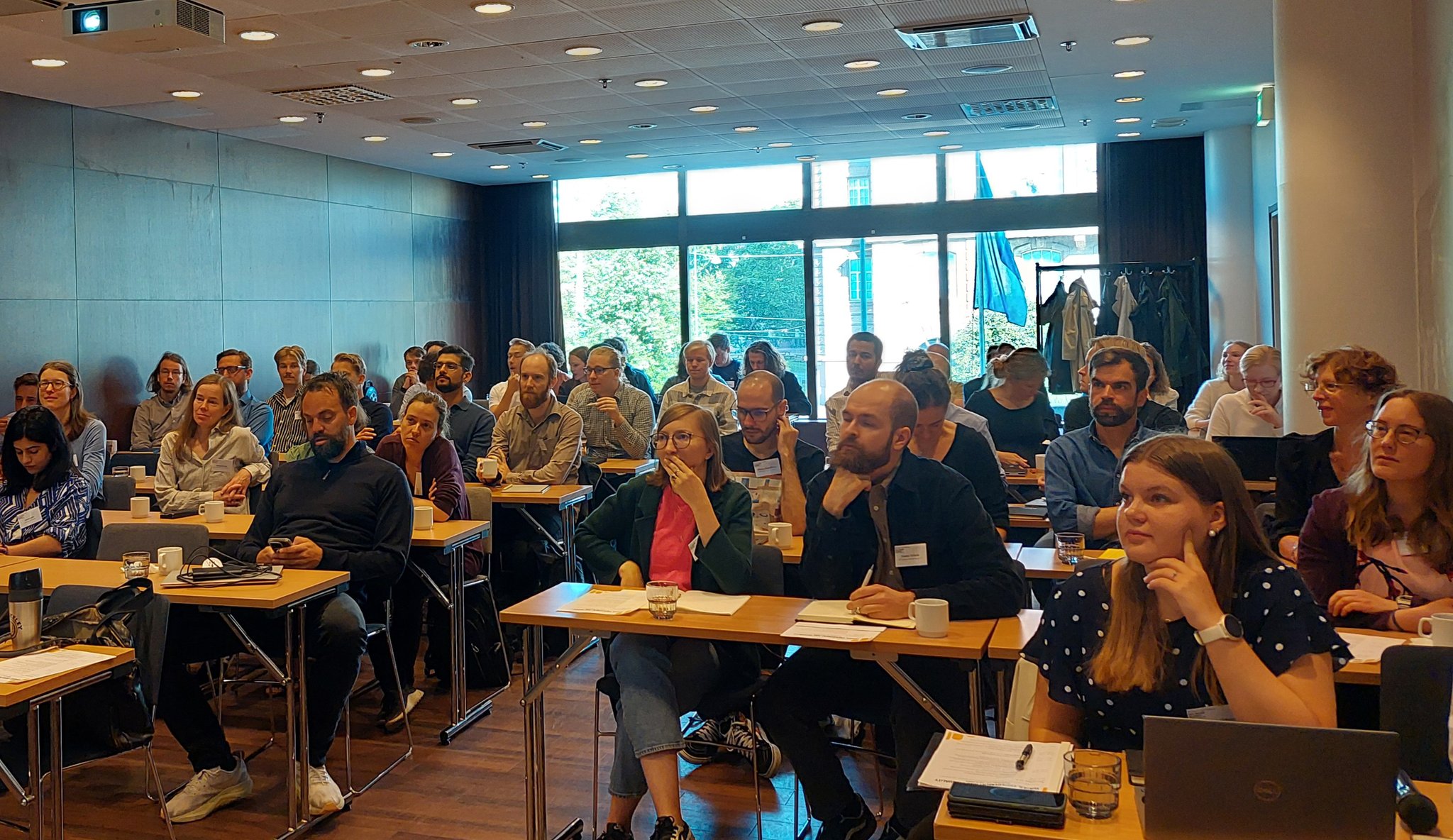
26.08.2025 |
News
Leading economists convened in Helsinki for WEI 2025: Wages, Employment and Inequality
Almost 70 economists from across Europe gathered in Helsinki on 21–22 August 2025 for the third Workshop in Labor Economics: Wages, Employment and Inequality (WEI 2025). The two-day event featured keynote lectures by Stephen Machin (LSE) and Magne Mogstad (University of Chicago), alongside a rich programme of sessions and flash talks presenting recent research. Discussions focused on wages, employment, and inequality, with lively exchanges between senior and early-career researchers underscoring the workshop’s reputation as one of the high-quality forums in labor economics in Europe.
WEI 2025 workshop brought together about 70 senior researchers, post-doc researchers and PhD students for two days of intense discussions on core labour economics topics in Europe and beyond.
— Whereas the first WEI workshop in 2017 was motivated by the need to promote somewhat unsexy core labour economics among young scholars, now these topics are very trendy among economists, says Tuomas Kosonen, who is the force behind the seminar series.

The programme featured keynote lectures from two leading voices in the field. Stephen Machin of the London School of Economics offered new insights into union wage differentials and membership dynamics, sparking debate on the future of collective representation. Magne Mogstad of the University of Chicago followed with a high-quality presentation on supply and demand with heterogeneous markets. Both talks drew extended discussions well beyond the lecture hall.


The workshop also included invited lectures by Ana Cardoso (Institute for Economic Analysis, Barcelona) and Alexandra Spitz-Oener (Humboldt-Universität zu Berlin), who addressed, respectively, the consequences of fiscal austerity for the pharmacy sector and the effects of occupational gender composition on wages. Their contributions framed broader conversations on gender, inequality, and institutional design in labor markets.
In addition to the plenary talks, participants engaged with a rich programme of other sessions and flash presentations, covering themes such as job-to-job mobility, technological change, salary transparency, collective bargaining, and informal learning. The shorter presentations, in particular, encouraged lively exchanges between senior and early-career researchers, underscoring the workshop’s role as a forum for the dialogue.
The atmosphere throughout was collegial yet somewhat critical, with discussions continuing in hallways, over coffee, and at the workshop dinner hosted at Restaurant Gillet. Organizers Tuomas Kosonen (VATT, FIT) and Oskar Nordström Skans (Uppsala University) noted that the high quality of submissions—nearly 100 in total—reflects the growing demand for this forum.
Programme
Venue: Sokos Hotel Presidentti, Helsinki, Finland
Thursday 21.8.
Session I – Chair: Oskar Nordström Skans
Ana Cardoso: Sharing the Burden: The Effect of Crisis-induced Spending Cutson Retail Pharmacy
Maria Hoen: The Role of Job-to-Job Changes for the Child Penalty in Career Progression
Flash talks 1 – Chair: Tuomas Matikka
Ricard Grebol Jiménez: Firm Productivity and Attractiveness: Evidence from Online Job Search Data
Joonas Tuhkuri: Winners and Losers of Technology Grants
Adam Gill: Hire from Anywhere: Work-from-Home Offering and Firms’ Labor Market Access
Tuomo Virkola: Internships and the Allocation of Talent
Dogan Gülümser: Old and New Jobs: Understanding Wage Formation, Sorting, and Firm Behavior
Keynote I – Chair: Tuomas Kosonen
Stephen Machin: Union Wage Differentials and Membership Dynamics
Session II – Chair: Cristina Bratu
Manuel Bagues: Gender Segregation in Childhood Friendships and the Gender-Equality Paradox
Amen Jalal: Screening Women Out? Experimenting with Salary Disclosure in Job Ads
Flash talks 2 – Chair: Roope Uusitalo
Toni Juuti: European CBA systems and wage distributions
Agneta Berge: Two-tier collective wage bargaining in a frictional labor market
Mikko Silliman: Beyond Training: Informal Learning, Worker Agency, and Market Structure
Frederik Almar: Educational Ambition, Marital Sorting, and Inequality
Stefano Lombardi: Genetics and Employee Sorting
Dinner at Restaurant Gillet, Can Can, Kasarmikatu 23
Friday 22.8.
Session III – Chair: Hanna Pesola
Jon Piqueras: The Asymmetric Effect of Wage Floors: A Natural Experiment with a Rising and Falling Minimum Wage
Elena Mattana: Dynamic Wage Setting: The Role of Monopsony Power and Adjustment Costs
Session IV – Chair: Kristiina Huttunen
Marina Ligato: Should We Let Employers Decide Who Can Return to Work After Being Sick? Lessons From Belgium’s Reintegration Trajectories
Peter Zorn: Household Labor Supply Elasticities: Evidence from Cross-Border Workers
Keynote II – Chair: Oskar Nordström Skans
Magne Mogstad: Supply and Demand with Heterogeneous Markets
Session V – Chair: Tuomas Kosonen
Alexandra Spitz-Oener: Does the Gender Composition of an Occupation Affect Wages?
Julia Baarck: The Effect of Military Service on Occupational Choice
Organisers and funding
Tuomas Kosonen, VATT, FIT
Oskar Nordström Skans, Uppsala University
The workshop is jointly organized by the Finnish Centre of Excellence in Tax Systems Research, VATT Institute for Economic Research and Uppsala Center for Labor Studies at Uppsala University. The workshop is funded by the Yrjö Jahnsson Foundation, the Finnish Centre of Excellence in Tax Systems Research, VATT Institute for Economic Research and Handelsbankens Forskningsstiftelser.





Photos: Marjukka Hourunranta and Rebecca Lakkonen